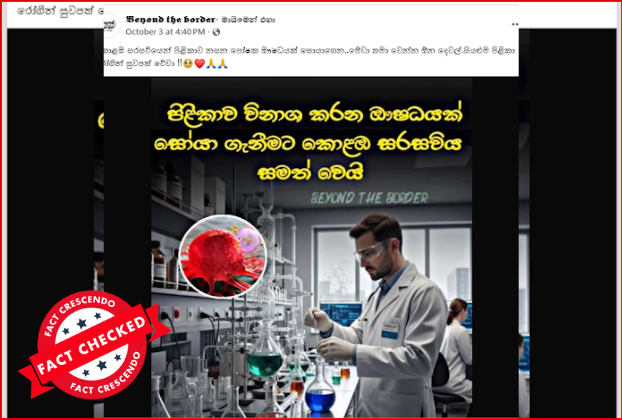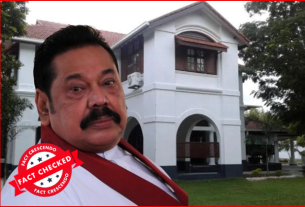Subscribe to our WhatsApp Channel
According to the World Health Organization (WHO), cancer is one of the deadliest diseases worldwide, claiming nearly 10 million lives each year. In this backdrop, the public attention is drawn towards research claiming progress towards a “cancer cure”.
Several Sri Lankan media outlets and social media users have reported on a “nutritional medicine” developed by the Institute of Biochemistry, Molecular Biology, and Biotechnology (IBMBB) at the University of Colombo, claiming that it can kill cancer cells and it is a potential treatment or prevention for cancer. We investigated this matter.
Social Media Posts :
A post was circulating on social media stating that the University of Colombo had successfully discovered a drug that destroys cancer.

This was reported by some media outlets as a cancer drug and a cancer treatment.

We took steps to fact-check the accuracy of these claims.
Fact Check :
In 2023, mainstream media reported that a research team led by Professor Sameera R. Samarakoon of the Institute of Biochemistry, Molecular Biology and Biotechnology, University of Colombo, had discovered this medicine.
It further states that international medical research has confirmed its ability to control the growth of cancer cells, and that this drug, called ‘Vernolac’, has now been released to the market and is available to patients in need at subsidized prices.
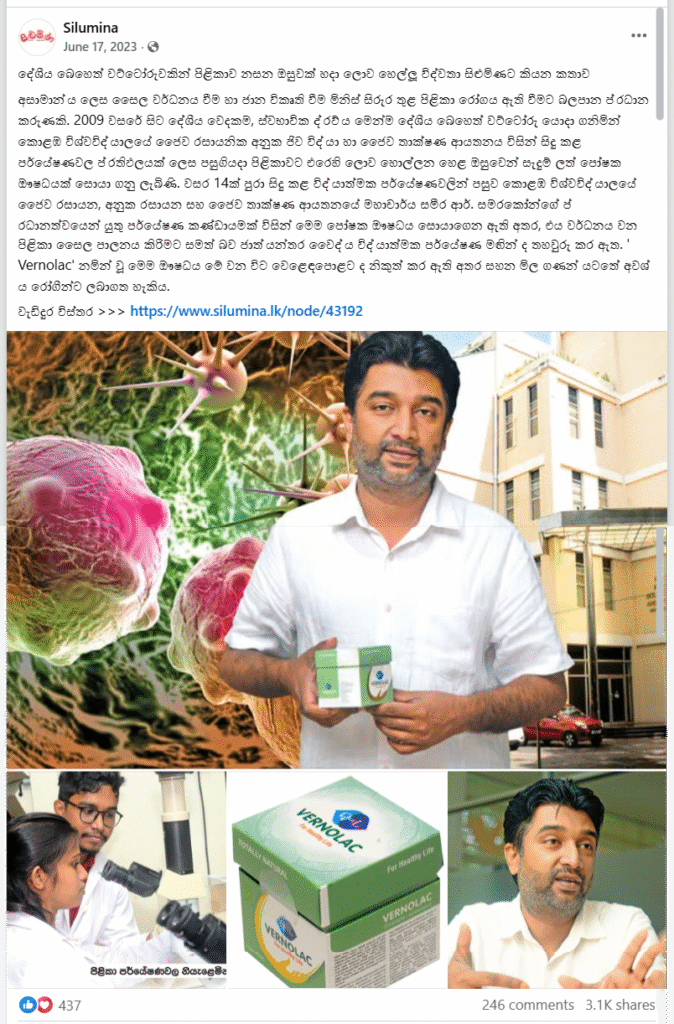
Vernolac, introduced by some major media outlets as a cancer treatment and sold by FADNA (Food & Nature Pvt. Ltd.) was mentioned on its online marketplace as follows.
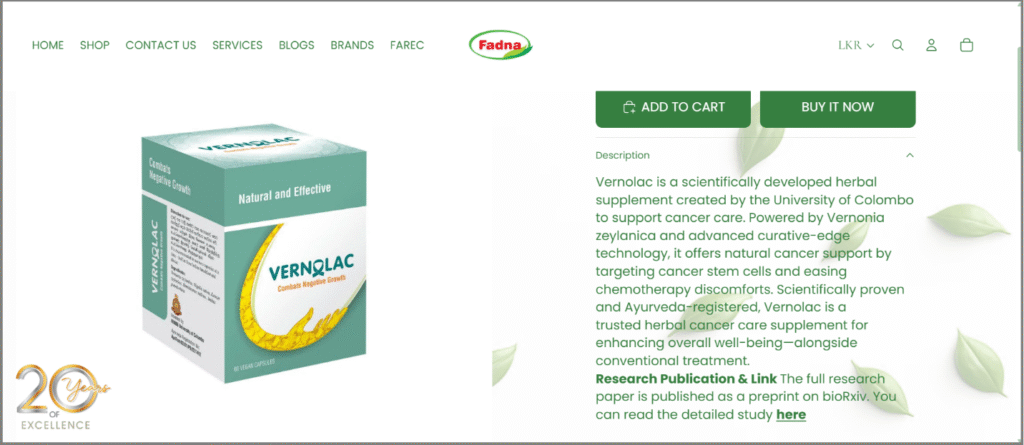
Vernolac is a scientifically developed herbal supplement created by the University of Colombo to support cancer treatment. Powered by Vernonia ceylonica and advanced healing technology, it provides natural cancer support by targeting cancer cells and relieving chemotherapy discomfort. Scientifically proven and registered in Ayurveda, Vernolac is a trusted herbal supplement for cancer care, designed to enhance overall well-being when used in conjunction with conventional treatments.
Accordingly, it is not stated that this medicine cures cancer regularly. However, social media as well as the mainstream media have reported on this medicinal supplement as a cancer treatment, a cancer drug, a cancer-killing drug.
However, if this medicinal supplement has been so genuinely successful, the Ministry of Health should have intervened or publicized it; however, no such reporting or announcement has been made by the Ministry of Health.
This drug was initially promoted as a treatment for cancer prevention. However, if it has been successful for the past two years, the University of Colombo should have advertised it, either through its official website or Facebook page, or through the intervention of another university and state sponsorship; however, no such advertisement was visible.
The University of Colombo had published a notice regarding this, as follows.

Similarly, a post was made on the official Facebook page of the University of Colombo on the 9th, stating that several misleading posts had been posted on social media, misusing the university’s name.
It states that, considering the profound impact on the university’s reputation and patient safety, steps will need to be taken to prevent the spread of misleading information, and that the general public will be informed about the university’s research and development activities only through the university’s official website or social media pages.
It further stated that although several research studies conducted by the university have investigated the medicinal properties of medical preparations, they have not yet reached the clinical trial stage or drug registration stage and cannot be considered medicines. Therefore, patients are advised to adhere to the registered medicines prescribed by qualified doctors.

The Sri Lanka College of Oncologists also posted a Facebook post regarding this, as a message from the Sri Lanka Association of Surgical Oncologists. It contained the message that,
- Cancer can only be completely cured through treatments that have been scientifically proven medical treatments, according to the prescribed standards.
- Do not put your life at risk by using unregistered or unapproved treatments. If you resort to the wrong treatment, you may not get another chance to save your life.
- If you have any doubts, please visit your nearest cancer treatment centre for proper advice and care.
These notes also indicate that the above herbal supplement cannot be considered a cancer treatment, a cancer drug, or a cancer-killing drug, and that people should not put their lives at risk by using such things.

Nevertheless, no institution or individual is responsible for the side effects that you experience after taking this supplement without a medical prescription. This is evident through a post published on the official Facebook account of Professor Sameera R. Samarakoon, who was involved in the production of this herbal supplement.
It stated that a preclinical study has confirmed the research findings, and continuous research and trials are being conducted under the guidance scientific supervision. It is recommended that patients strictly follow the medical procedures and instructions provided by qualified medical professionals.
“Neither I, our institution, nor the University of Colombo will be held responsible for any adverse consequences resulting from failure to follow proper medical treatment.”

Requirements of International Institutions to “prove” a treatment.
According to the World Health Organization (WHO), the FDA, and other international regulators, any product that claims to treat, cure, or prevent diseases such as cancer must undergo rigorous testing and receive proper approval before making such claims.
The WHO and the International Agency for Research on Cancer (IARC) emphasize prevention through evidence-based methods, rather than relying on unproven supplements.
International regulatory and scientific standards (FDA, EMA, WHO, IARC) require clinical trials and peer-reviewed evidence before a product can claim to treat, prevent, or cure a disease. Dietary supplements are regulated differently from drugs in many jurisdictions. Supplements can be marketed with information on their structure, function, and health benefits, but they cannot legally claim to cure diseases without obtaining drug approval. A marketed herb/ supplement cannot be called a proven cancer drug unless it has passed regulatory and clinical criteria. You can refer to more information here.
The risks of patients
Due to traditional treatments that are not supported by evidence (surgery, chemotherapy, radiation, and approved immunotherapy), these treatments can be delayed, leading to patient vulnerability. When lab results are overestimated in a way that promotes this, it provides false hope and compromise patient safety. That’s why oncologists publicly warn against using such products as substitutes for approved care.
What is supported by the evidence?
Although it is justified that ‘Vernolac’ has shown anti-cancer activity in laboratory experiments and further research has been conducted in animal studies, toxicology, and well-designed clinical trials to evaluate safety and efficacy in humans, the message that should be conveyed to the public is that this is not a proven cancer treatment, but an experimental nutritional medicine with internal results. It is misleading to market this product by claiming that it “kills cancer in humans.” The research paper on ‘Vernolac’ is here.
Ayurvedic Doctors.
Medical experts consistently warn that just because something is natural or herbal doesn’t automatically mean it’s safe or effective. Some herbs can interfere with cancer treatments or liver function, so patients should always consult an oncologist before using any supplement.
We have inquired with the Ministry of Health, the University of Colombo, and oncologists regarding this matter, and we hope to update this article with their responses.
Join us to learn more about our investigative fact findings.
Facebook | Twitter | Instagram | Google News | TikTok | Youtube
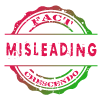
Title:Did the University of Colombo invent a Cancer treatment?
Fact Check By: Fact Crescendo TeamResult: Misleading



